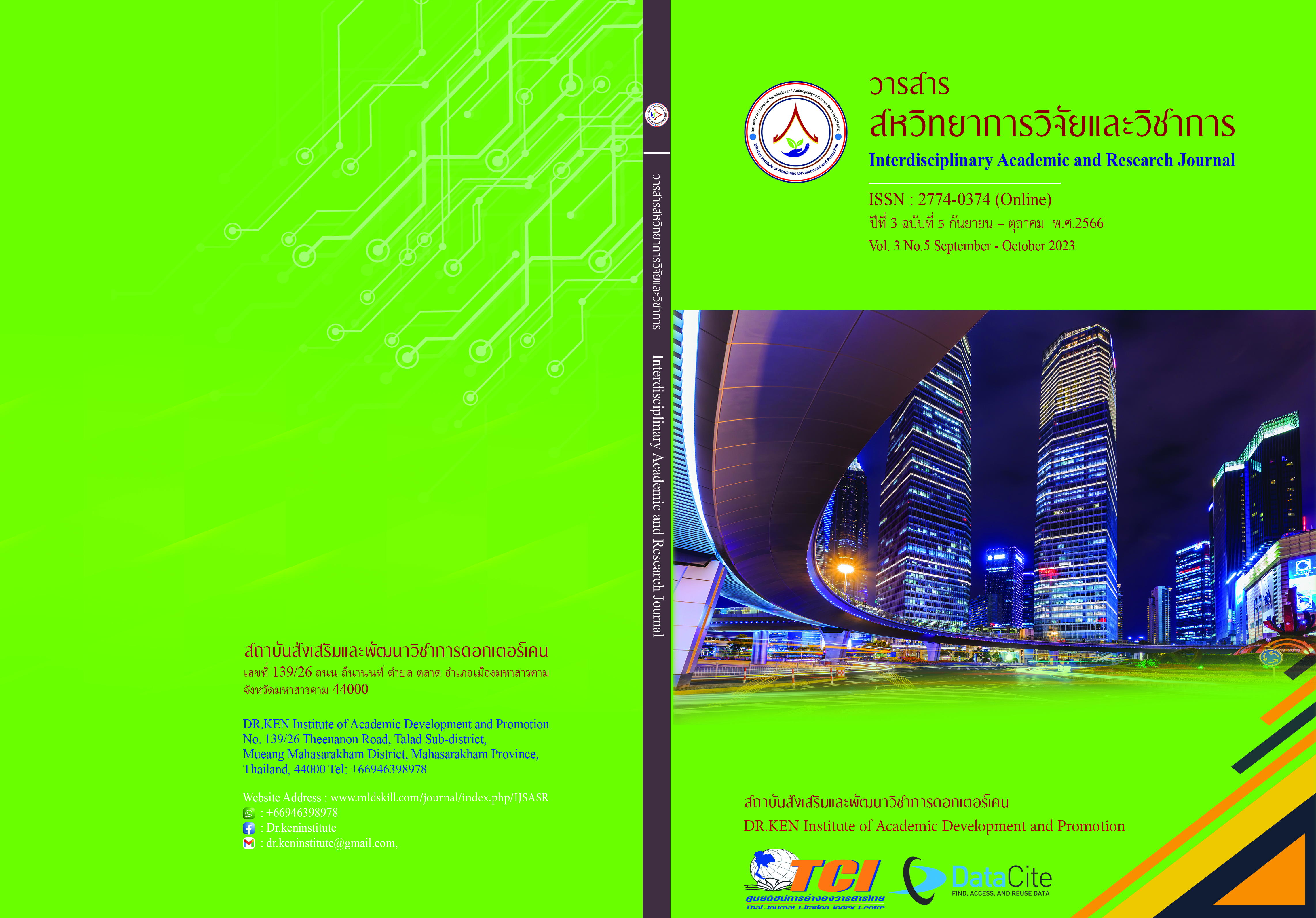The Effects of Using Parents' Involvement Activity Packages to Encourage Self-Control of Young Children
DOI:
https://doi.org/10.14456/iarj.2023.266Keywords:
Activity Packages, Self – Control, Young ChildrenAbstract
For early childhood children to live and grow up to be complete human beings in terms of living and working, it is necessary to strengthen early childhood children to be able to control their thoughts, emotions, and behaviors to achieve their goals, in which self-control is one of the key elements in life skills and one of the soft skills that cannot be learned through reading manuals or textbooks, must only be learned through experiential learning processes. Thus, the purpose of this research was to study the effects of using parents’ involvement activity packages to encourage self-control in young children. The target group in this study was the parents from 8 families who have 5-6 year-old children studying early childhood education at Satit Prasanmit Demonstration School (Elementary). The young children all were studying in the summer program in the academic year of 2023. The period of the experiment was carried out for 7 weeks. The instruments used in this study were: 1) parents’ involvement activity packages to encourage self-control of young children, called ‘Self-control Paplearn Jai,’ contained 8 packages with 16 activities; 2) a behavior observation form to check the self-control of children during the use of parents’ involvement activity packages; 3) an opinion interview form toward the parents’ involvement activity packages to encourage self-control of young children. The qualitative data was verified by content analysis. The research revealed that the self-control of young children who received the parents’ involvement activity packages to encourage self-control of young children was increased. For memory and application, young children could memorize the information and explain the relevant situations or actions properly. They also concentrated and focused on work continually. For contemplation, young children could set their goals and plan to complete their work by themselves. They even showed their emotion and feelings complying with the certain situation. They could control their emotion and perform appropriately in their daily life. Parents were satisfied with the activity packages which were interesting and suitable for the current situation. The equipment and materials were well-prepared, and the instructions for the activity packages were clear and easy to understand. The obstacle throughout the use of activity packages was a time limit. Parents could do the activities only at night. However, the parents gained more knowledge and understanding to encourage the self-control of young children. They could use all the knowledge to teach their children further in their daily life well. The impression of activity packages led to a good family relationship. Parents could see the behavior modification of their children’s self-control in succession.
References
กระทรวงศึกษาธิการ. (2559). หลักสูตรการศึกษาปฐมวัย พุทธศักราช 2560. กรุงเทพฯ : กระทรวงศึกษาธิการ
กุลยา ตันติผลาชีวะ. (2554). การมีส่วนร่วมของผู้ปกครองกับโรงเรียน. การศึกษาปฐมวัย, 5(4), 30 - 37.
จุฑาทิพย์ โอบอ้อม. (2556). การพัฒนาโปรแกรมการให้ความรู้ผู้ปกครองเพื่อส่งเสริมทักษะชีวิตของเด็กปฐมวัย. ศึกษาศาสตรมหาบัณฑิต (ปฐมวัยศึกษา) สาขาวิชาปฐมวัยศึกษา ภาควิชาการศึกษา มหาวิทยาลัยเกษตรศาสตร์.
ทิศนา แขมมณี. (2559). ชุดกิจกรรมการเรียนการสอนและการฝึกทักษะกระบวนการกลุ่มชั้นประถมศึกษาปีที่ 6. กรุงเทพฯ : ภาควิชาประถมศึกษา คณะครุศาสตร์ จุฬาลงกรณ์มหาวิทยาลัย.
เบญจวรรณ วิสุทธิเสน. (2562). ผลของการจัดกิจกรรมเล่นไม้บล็อกเป็นกลุ่มที่มีต่อทักษะการจดจ่อและควบคุมตนเองของเด็กปฐมวัย. วิทยานิพนธ์ศึกษาศาสตรมหาบัณฑิต (ปฐมวัยศึกษา) สาขาวิชาปฐมวัยศึกษา ภาควิชาการศึกษา มหาวิทยาลัยเกษตรศาสตร์.
สุปรียา ผาสุกสถิตพงศ์ และ ปิยะนันท์ หิรัณย์ชโลทร. (2565). ผลการใช้ชุดกิจกรรมการมีส่วนร่วมของผู้ปกครอง “PLAY AT HOME” เพื่อส่งเสริมการกำกับตนเองในเด็กปฐมวัย. วารสารนวัตกรรมการศึกษาและการวิจัย. 7(2), 438 – 454.
อรวรรณ สุวรรณศรี และ ปิยะนันท์ หิรัณย์ชโลทร. (2559). การศึกษาผลการใช้ชุดกิจกรรมการมีส่วนร่วมของผู้ปกครองเพื่อส่งเสริมทักษะพื้นฐานทางวิทยาศาสตร์ของเด็กปฐมวัย. วารสารศึกษาศาสตร์ปริทัศน์ มหาวิทยาลัยเกษตรศาสตร์. 31(2), 89-96.
อัจฉราลักษณ์ ทั่งทอง และปิยะนันท์ หิรัณย์ชโลทร. (2564). การให้ความรู้ผู้ปกครองเพื่อส่งเสริมความเป็นพลเมืองของเด็กปฐมวัยโดยใช้ชุดกิจกรรม “หนูน้อยสู้ภัยโควิด-19”. สิกขา วารสารศึกษาศาสตร์. 10(1), 167-181.
อารีนา มะแดเฮาะ ปิยะนันท์ หิรัณย์ชโลทร และชลาธิป สมาหิโต. (2664). การใช้ชุดการเรียนรู้ “Di Buemang” เพื่อส่งเสริมความคิดรวบยอดทางภูมิศาสตร์สำหรับเด็กปฐมวัย. วารสารการบริหารจัดการและนวัตกรรมท้องถิ่น. 4(4), 28-38.
Bandura, A. (1986). Social Foundations of Thought and Action: A Social Cognitive Theory. Englewood Cliffs, NJ: Prentice Hall.
Center on the Developing Child at Harvard University (2014). Enhancing and Practicing Executive Function Skills with Children from Infancy to Adolescence. Retrieved August 30, 2021, from: http://www.developingchild.harvard.edu.
Dewey, J. (1959). Experience and education. New York: Macmillan Publishing Company.
Diamond, A. (2012). Executive Functions. REVIEW IN ADVANCE 5(12), 19.2-19.20 and Program Planning. Applied Behavioral Sciences, 7(10), 466-492.
Epstein, J. L. (1995). School/ family/community partnerships: Caring for the children we share. Phi Delta Kappan, 76(9), 701-712.
Galinsky, E. (2010). How Do We Teach Children The Most Important Life Skills?: Prepared for the 14th Annual CCF Conference: Families as They Are: How do We Use What We Know? Retrieved October 13, 2021, from https://sites.utexas.edu/contemporaryfamilies/files/2013/11/2010-Fact_Galinsky_How-Do-We-Teach-Children.pdf
Heckman, (2012). Invest in Early Childhood Development: Reduce Deficits, Strengthen the Economy. Retrieved October 13, 2021, from: https://heckmanequation.org/resource/invest-in-early-childhood-development-reduce-deficits-strengthen-the-economy/
NAEYC (2016). Focus and Self Control. Teaching Young Children. 9(3), 10-13.
National Parent Education Network. (2022). NPEN Core Principles. Retrieved February 20, 2023, form https://npen.org/about-npen/core-principles
Unicef. (2019). Unicef Early Childhood Development Kit for Emergencies. Retrieved October15, 2021, from https://www.unicef.org/evaldatabase/files/UNICEF_ECD _Kit_Synthesis.pdf
Vygotsky, L.S. (1995). Fantasi och kreativitet i barndomen [Imagination and Creativity in Childhood]. Goteborg: Daidalos.
Downloads
Published
How to Cite
Issue
Section
License
Copyright (c) 2023 Supaporn Samaun, Piyanan Hirunchalothorn, Chalatip Samahito

This work is licensed under a Creative Commons Attribution-NonCommercial-NoDerivatives 4.0 International License.
Copyright on any article in the Interdisciplinary Academic and Research Journal is retained by the author(s) under the under the Creative Commons Attribution-NonCommercial-NoDerivatives 4.0 International License. Permission to use text, content, images, etc. of publication. Any user to read, download, copy, distribute, print, search, or link to the full texts of articles, crawl them for indexing, pass them as data to software, or use them for any other lawful purpose. But do not use it for commercial use or with the intent to benefit any business.
















.png)


